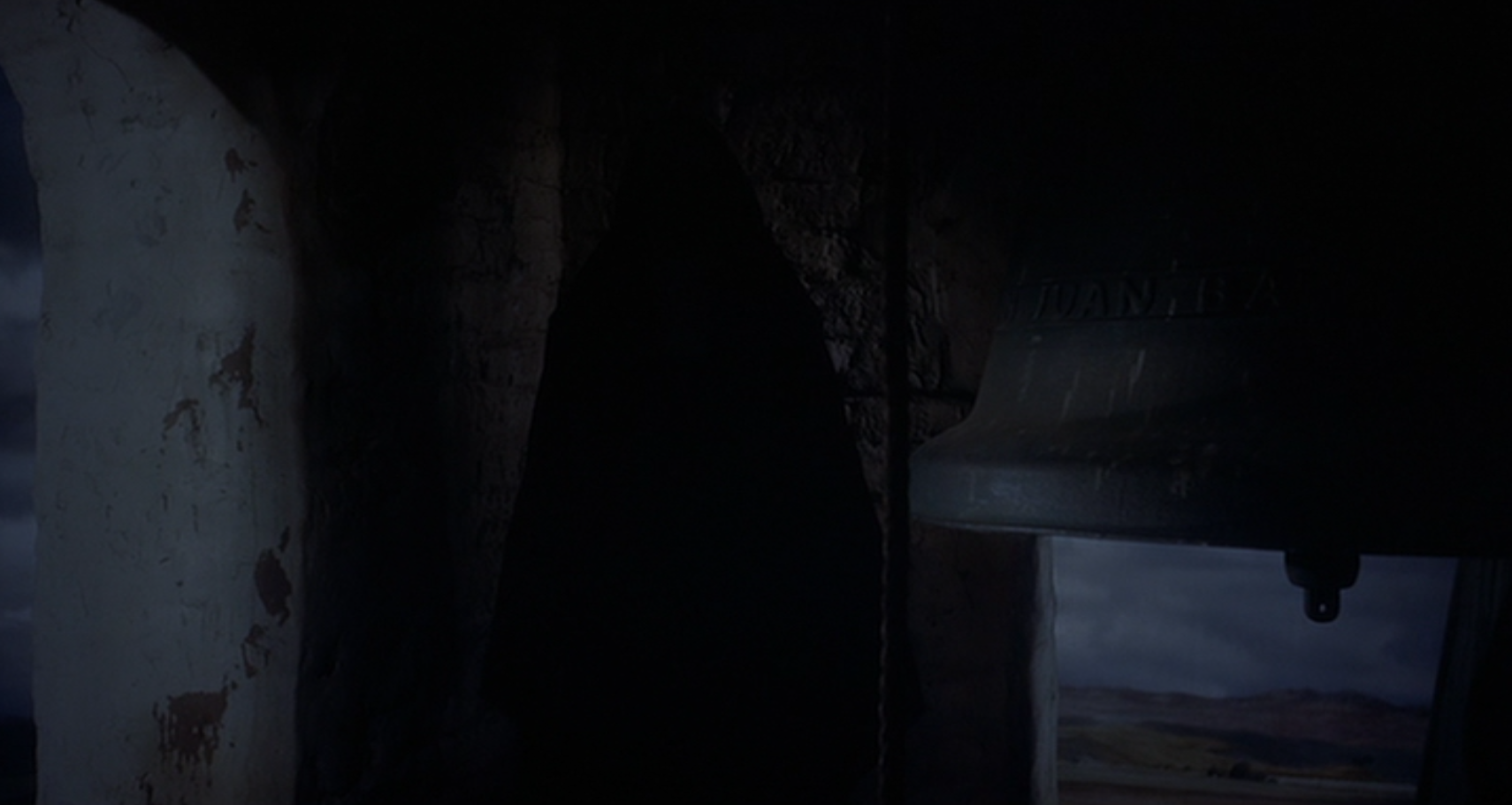
Vertigo TOC | Part 1 | Part 2 | Part 3 | Part 4 | Part 5 | Films Home
LINKS TO SECTIONS OF THE ANALYSIS ON THIS PAGE:
Let me take care of you
It can't matter to you
Just like medicine
Tristan and Iseult and Cocteau's "The Eternal Return"
But first, muss me a little
This is my second chance
Crossfade from Judy clasping her lavender dress to her breast to a busy dining room at Ernie's. John has taken her to where he first saw Madeleine on the night of the opera. This evening, the diners are not so lavishly turned out, the women are in street attire rather than gowns, which means the bulk of the crowd, that other night, had also been on their way to the opera. The camera pans to show that where Judy and John are seated is but about two tables over from where Madeleine had dined with Gavin, Judy and John on the foreground side of the fireplace mantle above which hangs the framed fan. Rather uncomfortably, it seems, they dine, stiff, not speaking to one another. A medium close-up of John shows him glance up from his meal to have his attention captivated by something beyond the camera. A medium close-up of Judy with the bar beyond reveals another of Madeleine's ghosts has entered. Hitchcock shows what John sees, Kim Novak as Madeleine in her gray suit with the white scarf about her neck, white gloves, just as she was on the first day he followed her. Judy, looking up, notices that John's attention has been drawn beyond her. Cut to John looking down, his aspect shrouded with dejection. Cut back to Judy who turns toward what had caught John's attention. Hitchcock now shows us the reality, which is not Madeleine but a blond woman in a gray suit darker than what was Madeleine's, and the audience is already familiar with her for she is the blond woman who had caught John's attention when he returned to Ernie's previously, visiting his past, and was startled by Madeleine's elegant ghost, in a black suit with a white collar, who on second glance became this same woman. Cut to a medium close-up of the woman, a simple strand of pearls about her neck, she being seated at the next table with her party. A close-up of Judy contrasts her dramatic make-up and rhinestone-ringed costume jewelry earrings with the other woman's sophisticated simplicity, and shows Judy's awareness that she has been compared with this other woman and been found wanting. Lips gently parted, downcast, Judy turns her gaze back to John then returns to eating.
If we had imagined that Kim Novak must always appear resplendent in any setting, in any costume, this scene painfully depicts Judy, in comparison with Ernie's other clientele, as cheap, even gaudy, loud. Money is partly to blame—Judy hasn't any and it shows in the cheap fabric of her dress and its off-the-rack cut. In respect of San Francisco society, she is uncultivated—never mind that John himself, as a retired police detective on a fixed income, however "independent", isn't a candidate for the social register. John is not a wealthy man, but he takes Judy to a venue that was appropriate for Madeleine, to experience the kind of restaurant to which Madeleine would have been accustomed. This is not Judy's natural environment, and she dare not pick up again the mannerisms she'd used for Madeleine lest she reveal who she is. Plus, she hopes to make John love love her for herself.
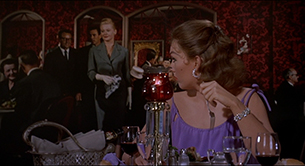 |
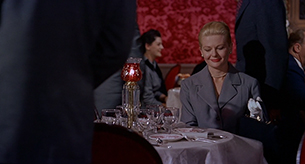 |
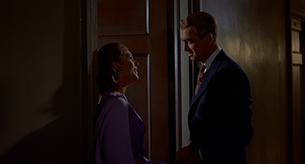 |
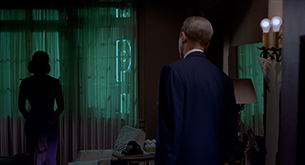 |
Crossfade to the exterior of the Hotel Empire. John parks his car before it and they both exit. Crossfade to John and Judy walking down the hall to her room. Despite what seemed like a disastrous dinner date, John is smiling, even laughing, a few care-worn years have even been shed from his face. Judy, too, obviously seems to have enjoyed herself. The situation between them must have improved after they left Ernie's, when there was less pressure, when they weren't perhaps where Madeleine and John had been in that former life. At her door she fumbles with her key, nervous, and John assists her in opening it. She turns to thank him and is surprised when John proposes not just seeing each other the next night but the following morning. She protests she has to work and John offers, "Let me take care of you, Judy." They move to inside Judy's darkened room, the bright green of the Empire Hotel neon beyond, Judy's profile observed only in poignant silhouette. John having entreated Judy to let him "take care of" her, it can easily be interpreted as the older and more financially secure man offering to be the sugar daddy. Judy balks, but then accepts when he pleads he only wants to be with her as much as possible, nothing more.
John (helps Judy with her keys and door): Here. I'll do it. There you are.
Judy: Thanks again. Good night.
John: Can I see you tomorrow?
Judy: Tomorrow night? Well...
John: No, I mean tomorrow morning.
Judy: But I have to go to work. I've got a job.
John: Don't go to your job.
Judy: What'll I live on? My oil wells in Texas?
John: Let me take care of you, Judy.
Judy: Thanks very much, but no, thanks.
John: No, Judy, you don't understand.
Judy: Oh, I understand, all right. I've been understanding since I was 17. And the next step is?
John: No, no. No, no.
Judy: No? Then what?
John: We could just see a lot of each other.
Judy: Why? Because I remind you of her? It's not very complimentary.
And nothing else?
John: No.
Judy: That's not very complimentary either.
John: I just want to be with you as much as I can, Judy.
Judy: Well, I guess I could phone the store in the morning, and make some excuse.
Two more scenes follow of John and Judy dating. They slow dance together in a ballroom that is, for the most part, filled with older individuals. Neither John nor Judy look like they are enjoying themselves, certainly not John who, again, is stiff and distracted. He is obviously unhappy with what Judy is, and how she is not Madeleine. Judy stands out as the only young woman in the ballroom, and John's stiffness, his judgmental silence, accentuates the age disparity between them which might not otherwise be too painfully obvious if not for his dissatisfaction with her.
Then Judy and John visit the Palace of Fine Arts, a building which I've already written of in Part Two, its relationship to the Portals of the Past, and the Palace of the Legion of Honor. Our first glimpse of this building had been from a hilltop as John followed Madeleine to the Legion of Honor prior her leap into the Bay and John's rescue of her which had made him feel both confidently heroic and possessive. Madeleine had even, afterward, stroked his ego when she praised his name as strong. As they walk past the Palace of Fine Arts, birds picturesquely fly beyond them, and we may be reminded of several birds that flew beyond Madeleine at Cypress Point where they first kissed.
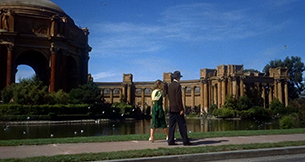 |
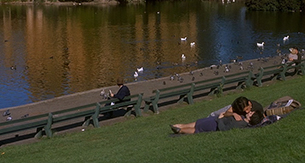 |
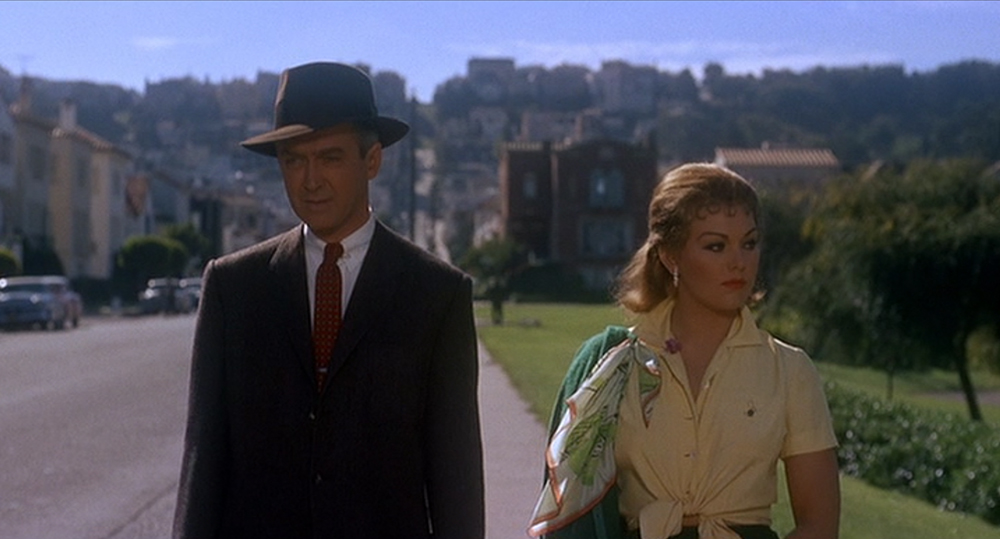
The manner in which Judy looks wistfully at the couple kissing on the grass, we feel again how much younger she is than John, but they are not only separated generationally but by John's contempt for her. No doubt he had winced when he picked her up and she was wearing a shirt that tied at the midriff. As for Judy's wistful envy of the couples romancing one another, it's impossible to imagine John taking off his hat and relaxing on the grass for a picnic and a few kisses.
Judy looks to the future, seemingly not plagued with guilt by her complicity in Madeleine's death, though she might feel some redemption will be had if John falls i love with her. She wants future happiness, fun, a relationship, romance, what the contented couple on the grass appear to have. As for John, I imagine he has brought Judy here to be with him as he relives when he passed the Palace of Fine Arts the day he followed Madeleine to the Golden Gate Bridge where she attempted to commit suicide, but he'd rescued her, then lost her again. I don't know if on the big screen the audience can see the statues of the Weeping Women high on the Corinthian columns of the Palace's colonnade, their backs turned to the world, bent over seeming ossuaries, weeping over the bones of the past.
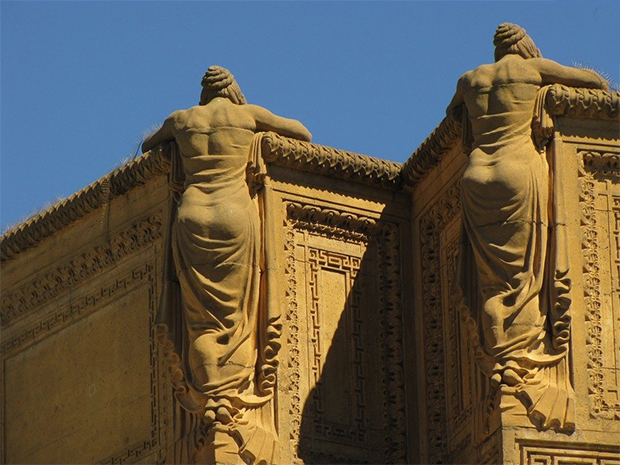
Pixv#org copyright free image of Weeping Women, Statues on Facade of Palace of Fine Arts
Hitchcock would later state that James Stewart was miscast, too old for the role, but these scenes reveal that an older man was exactly what Hitchcock wanted, for Hitchcock plays up the age difference in them. John not only desires Madeleine rather than Judy, he belongs to a different world. Recollect that the pin-up magazine Swank, that he had on his coffee table, in the 1950s had for its mascot an older man with white hair and white mustache, comically portrayed, often in competition with a younger man. Sometimes he gets the women and other times not. The magazine's masthead included, on some issues, "For the Man Who Knows". For a while in the 1940s a spare illustration of a top hat and cane were featured on the cover. Esquire also had an elder mascot, bald with a mustache, on its cover during the mid 1950s, but Esqure's version was very different, its publication and its presentation moving up-market while Swank was stuck in being classy but not too classy and sticky with cheesecake but not as bold as others were becoming. I don't know what demographic Swank was aiming for during that period, but it strikes me as inviting for bachelor John who is no longer young but could think of himself as the older "Man who Knows", one who has the experience a younger man lacks. So his sense of virility and self-worth have likely been threatened by all that he's been through, his trauma, his guilt, his vertigo, his retirement, but as an older man of some small means he can pay for a young woman's companionship and refine her...groom her, let her "benefit" from his experience. There are three Johns in this film--there is the John we know has been conned, who has been disastrously wronged and we feel for him and wish justice for him; there is the John who we interpret as deep down, unconsciously knowledgable that Judy is Madeleine and we excuse him his behaviors in his quest to bring this truth to the light; and then there is the John who only knows Judy reminds him of Madeleine, he doesn't care about her, who she is, he doesn't care about her feelings or what she wants, he doesn't care if he forces her to lose herself as he grooms her to satisfy his desire for Madeleine. All of these men are on screen, but it's the third John who is abusive, and whose abusiveness is too often overlooked in deference to what he's suffered.
The section in which John pressures Judy to be fitted with Madeleine's gray suit begins with them both in front of a store window in which we see two decorative, wintery, denuded trees, one black, the other white. Their sharp, angular limbs remind of a similar black tree-form that Midge has in her apartment, leaning up against a dresser, that form having been used for holding a couple of scarves. At the film's end, when John returns with Judy to San Juan Bautista, the matte painting of the church will show in the foreground the stark form of a dead tree. We may also be reminded of the bare limbs of a tree featured prominently in the Cypress Point section, when John had caught Judy as she ran toward the ocean. In the Saul Bass poster inspired by that scene, Madeleine looks like she has just been caught by the threatening figure of a man, when in fact John feared what she might do, that she might try to commit suicide again. Another way of looking at the poster is that he was holding on to her so she wouldn't fall into or be sucked into the abyss below.
John and Judy stop before the window at a flower stand. She points out a blossom that she likes, but John ignores her choice and selects another.
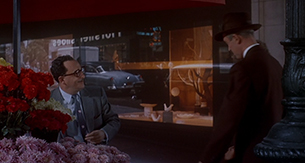 |
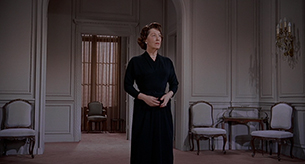 |
With adoring and rather desparate eyes, Judy happily accepts John's choice, while he is less than present, already concentrating on the clothing store across the street, Ransohoffs, to which he says he has plans to take her next, to get her new clothes that he's promised. Judy seems excited over the prospect yet also protests it's not necessary. John insists she must have only the best--but as John directs her across the street and through women dressed in furs we think of John's limited resources on his retired detective's fixed income and how though he would likely have comfortable savings he is not of a class to normally afford such expenditures. In the novel, Roger (John) has similar problems, carelessly abandoning his law partnership and spending beyond his means on Renee (Judy).
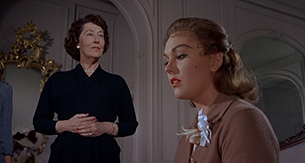 |
 |
Not only do we well comprehend how "nothing but the best" is going to made a deep cut in John's finances, in his effort to recreate Madeleine, the saleswoman at the dress shop obviously feels that she is negotiating a difficult and peculiar situation. As John turns down all the gray suits they are shown, Judy becomes aware that his plan is to dress her like Madeleine, and the saleswoman even remarks that he seems to know what he wants, her demeanor cautious and guarded. His intensity escalates quickly so that he is not only emotionally abusive with Judy, quietly but sternly controlling her, he becomes subtly physically abusive with her as well. The saleswoman has been taken aback by John's behavior, not just that he is dressing Judy rather than allowing her to dress herself, but by his aggression. He insists he knows what's right for her. When Judy stands and goes over to the mirror, he follows and grasps her upper arm far too firmly, putting the saleswoman on guard but she doesn't intrude--John is the man who is calling the shots, who is paying, and she treads lightly. When she finds the right suit, it occurs to us that Madeleine's clothes would have come from this shop. For Judy, this suit is but a duplicate of her copy of Madeleine's death suit that she still has in her closet.
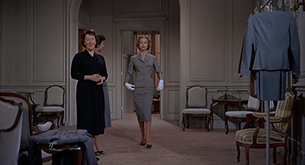 |
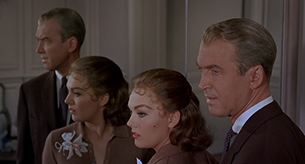 |
When John asks for a black evening dress with a square neck, Judy's face contorts in such obvious agony that just how much control John exerts over her and the situation is alarmingly evident. Next we see them at a shoe shop, where a man waits on them instead, and Judy, we feel, has given up the fight.
Judy: I like that one.
John: Like that?
Judy: Yes.
John: Fine.
Flower salesperson: That's very nice.
Judy: It's beautiful.
John: There we are. Now, we get this, then we'll buy you those clothes.
Judy: Honest?
John: Right over there's Ransohoffs. Nothing but the best. How much?
Flower salesperson: That'll be 50 cents. Thank you.
Judy: You don't have to.
John: I want to. (Being shown a gray suit by the sales woman.)
No, that's not it. Nothing like it.
Woman at Dress Shop: But you said gray, sir.
John: Now, look. I just want an ordinary, simple gray suit.
Judy: But I like that one, Scottie.
John: No, no, it's not right.
Woman at Dress Shop: The gentleman seems to know what he wants.
All right. We'll find it.
Judy: Scottie, what are you doing?
John: I'm trying to buy you a suit.
Judy: But I love the second one she wore.
And this one, it's beautiful.
John: No, no, they're none of them right.
Woman at Dress Shop: Oh, I think I know the suit you mean. We had it some time ago. Let me go and see. We may still have that model.
John: Thank you.
Judy: You're looking for the suit that she wore, for me.
You want me to be dressed like her.
John: Judy, I just want you to look nice.
I know the kind of a suit that would look well on you.
Judy: No, I won't do it!
John: Judy. Judy, it can't make that much difference to you. I just want to see what ...
Judy: No, I don't want any clothes. I don't want anything. I want to get out of here.
John: Judy, do this for me.
Woman at Dress Shop: Here we are.
John: Yes, that's it.
Woman at Dress Shop: I thought so.
Judy: I don't like it.
John: We'll take it.
Will the thing fit?
Woman at Dress Shop: Well, yes. It might need some slight alterations, but it's madam's size.(To model.) All right, dear. (To John.)
We'll have it for you to try on in a moment.
John: Well, how long will the alterations take?
Woman at Dress Shop: Well...
John: May we have it by tonight?
Woman at Dress Shop: Well, if it's absolutely necessary.
John: Yes, it is. Now, we'd like to look at a dinner dress, an evening dress, short, black, with long sleeves and a kind of a square neck.
Judy: Scottie!
Woman at Dress Shop: My!
You certainly do know what you want, sir. I'll see what we have.
John (at shoe store): All right. That's it. Do you have them in brown?
Man at Shoe Store: Yes, we have.
John: Fine.
At John's, Judy leans across his desk, exhausted, desolate enough that he pours and he gives her a drink, as "medicine", just as he had given Madeleine a drink as medicine the morning she arrived with more information on her dream of what he was able to tell her was San Juan Bautista.
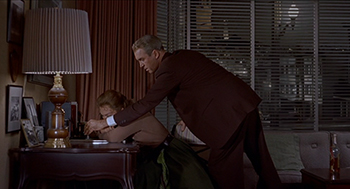 |
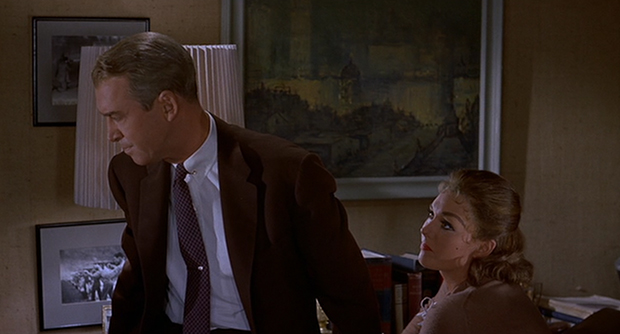
|
John had told Judy at the clothing store that his making her over couldn't make that much difference to her, and he repeats this, that it couldn't matter to her, as if it is inarguable that the woman exists for the man, her appearance, her manner, not for herself, and she must mold herself to suit him. Just how abusive is John's behavior is subtly excused by Hitchcock with his having made the audience knowledgable that Judy had conned John and was an accomplice in Madeleine's murder, for we think of John as not only trying to resurrect Madeleine but subconsciously digging for the truth he must deeply suspect about Judy, that she is Madeleine. He is the police detective struggling with a case to uncover the reality of it as versus the illusions he's been fed. If we didn't have this knowledge, that Judy was Madeleine, had lied to him and was continuing to lie to him, it's likely that John would be viewed with less sympathy. As it is, it seems to take at least a couple of viewings for an audience to waken to John's abusiveness. But even as Hitchcock actively represses recognition of how John is abusing Judy, he plainly shows it in ways that should be shocking--such as with John gripping Judy's arm at the dress shop, to control her, and the alarm that the saleswoman displays.
We had seen in Judy's room a photo of her mother and one of her father before his hardware store. Now we see one of John's photos framed above his desk and it looks like men shooting at a rifle range, and we remember how violence is a part of John's profession and life, as if Hitchcock has now decided was the appropriate time to let us know the real potential for violence.
When John says Judy could leave if she wanted to, she responds he wouldn't let her, which we suspect is true. When John insists to her that he feels for her, that she doesn't only remind him of Madeleine, we might believe him, but when Judy says he doesn't want to touch her and he says that he does want to he is obviously lying. She repulses him. Finally she consents to wear the clothes he wants her to, if he will then love her. Which is when he turns his eyes to her hair and asks her to change that as well. No! But then she acquiesces, and still he can't kiss her. He puts a throw pillow on the floor, as he had done for Madeleine the day he'd rescued her from the bay, and has Judy sit on it, watching her closely, seeking in her the ghost of Madeleine.
John (at home): Here, Judy. Drink this straight down, just like medicine.
Judy: Why are you doing this? What good will it do?
John: I don't know.
No good, I guess. I don't know.
Judy: I wish you'd leave me alone. I want to go away.
John: You can, you know.
Judy: No. You wouldn't let me. And I don't want to go.
John: Judy, Judy, I tell you this, these past few days are the first happy days I've known in a year.
Judy: I know. I know because I remind you of her.
And not even that very much.
John: No. No, Judy. Judy. It's you, too.
There's something in you that...
Judy: You don't even want to touch me.
John: Yes, yes, I do.
Judy: Couldn't you like me, just me, the way I am?
When we first started out, it was so good. We had fun.
And then you started in on the clothes. Well, I'll wear the darned clothes if you want me to, .if you'll just like me.
John: The color of your hair.
Judy: Oh, no!
John: Judy, please. It can't matter to you.
Judy: If I let you change me, will that do it? If I do what you tell me, will you love me?
John: Yes.
Yes.
Judy: All right. All right, then, I'll do it. I don't care anymore about me.
John: Come on. We'll sit by the fire.
John's beckoning Judy to have a drink, like "medicine", comes from Tristan and Iseult. In the legend, the story generally appears to have them fall in love, unwillingly, having accidentally taken a love potion rather than a poison that Iseult believes has been prepared by her maid, by which she wants to kill Tristan, who is carrying her to a marriage she doesn't want, and she preferring to die by poison rather than marry. Midsummer Night's Dream comedy of errors concerning the love potion given the wrong individual can be light-hearted because it is reversed, even though it points out how fickle love is if love can be so easily redirected. With Tristan and Iseult, fate feels to play a heavier hand.
Judy doesn't take the drink that John gives her in this scene, but Madeleine had taken his offering of a drink as "medicine" the morning she went to tell him of her dream. Does it even matter if she drinks, or when she drinks? Does it matter that John doesn't drink with her? I don't think so. It's still Tristan and Iseult, with John as a knowledgable Iseult wanting to control Madeleine/Judy. Even the night he cared for her after rescuing her from the bay, he had just a shade too aggressively insisted she drink her coffee and sit in front of the fire, as if he couldn't permit her to say no. He too tenaciously cajoled.
The spiral in Carlotta's hair, which Madeleine repeats, reminds of John's vertigo, and the graphics at the opening of the film that can symbolize eternity conceived of as dizzying revolutions. Nietzche's concept of The Eternal Return, which has influenced many, is being referenced, but of course the idea existed before Nietzche, in various forms, and Hitchcock's treatment of it is his own expression of the mysteries of destiny and free will as suit the story.
In the book, Roger (John) is told of a portrait of Madeleine's great-grandmother, but as it is at the home of Madeleine and Paul (Elster), he doesn't see it until after Madeleine's death. In the book, Roger and Madeleine together visit a museum, the Louvre, but he doesn't follow her there to see her gazing upon a portrait of her great-grandmother. There is no observation of a bouquet of Carlotta's that is recreated by Madeleine. Roger is told, by Paul, of Madeleine recreating her great-grandmother's hairstyle in the painting, which is a heavy bun on her neck, but there is no mention of the engrossing spiral of the eternal return as we have in the film, depicted with the abyss at its center. Madeleine's possession by her great-grandmother is a fiction created to supply a reason for her determination to commit suicide, her destiny for some reason wound together with her great-grandmother's, that she must duplicate it, and doesn't make much sense when examined too closely as Madeleine's life history and circumstances don't duplicate her great-grandmother's, she is only bequeathed this urge to kill herself as a matter of mystical genetics, what some might interpret as Freud's death drive, and which Elster says is a matter of blood. But Carlotta has other unaffected descendants, and one wonders why Madeleine's mother and her grandmother didn't commit suicide if this is a family inheritance. What is it that has triggered Madeleine...other than the story being a fiction, the matter of destiny instead being that Judy, who plays Madeleine, who is her counterfeit, must die as Madeleine died.
What has been a nagging question for me was how was it decided to make such a strong tie with Tristan and Iseult, connecting to that story via Wagner's music, and pairing with The Eternal Return, which Hitchcock makes obvious with his spirals--all the many spirals throughout the film. Hitchcock intends The Eternal Return to go hand-in-hand with Tristan and Iseult.
The story in the book begins before the German occupation of France, goes silent during, then picks up again afterward, which is when Roger sees Renee in a newsreel. The German occupation of France is a hole in the book. It happened but appears not to be part of the story. Madeleine was, and then Renee is. One could say that inbetween France becomes a re-expression of Carlotta's possession of Madeleine in Germany's occupation of France. But that's not where I'm going. Instead, while studying again Cocteau's Beauty and the Beast, I was reminded of the existence of Cocteau's 1943 The Eternal Return, directed by Jean Delannoy, which I'd never seen. When I realized it was the most popular French film during the German occupation, and that its story was Tristan and Iseult, I wondered if in it might be found a solution for Hitchcock's pairing of Tristan and Iseult with The Eternal Return.
There are many variations on the story of Tristan and Iseult so it's pointless to attend to much but the basics if we are to compare Vertigo with Cocteau's The Eternal Return and the legend of Tristan and Iseult, but I should still relate the bulk of Cocteau's fim.
In The Eternal Return, the wonderfully handsome, orphaned Patrice (Jean Marais) decides what his wealthy, widower uncle, Marc, needs is a young bride. Specifically, and for some reason, this woman must be young. He visits an island his uncle owns with the purpose of collecting taxes and finding that bride. At a pub he comes upon a man who is abusing his orphaned, beautiful, young, blond fiancee, Nathalie (Madeleine Solonge), attempting to force her to drink against her will, and Patrice stops him. The two fight and when Patrice is wounded in the leg Nathalie takes him to her aunt who heals him with folk medicine. Though Patrice is obviously in love with Nathalie, but not realizing it, he proposes to her for his uncle. Nathalie accepts, though she is obviously in love with Patrice, for she believes he isn't in love with her. Nathalie's aunt, Ann, as a wedding present, gives her a bottle marked "poison" which is a love potion she can share with her older husband, Marc, that will make up for their differences in age etcetera by causing them to fall in love with one another, but Nathalie says she doesn't believe in such folk magic. Living with Patrice and his uncle is the evil family of Marc's sister-in-law, Gertrude. Her son, Achille, is an evil dwarf (this dwarf does appear in the legend as an evil magician) who has it in for Patrice. Patrice and Nathalie are of course in love but are in denial. Patrice complains that Nathalie doesn't act happy and demands they both have a good time by getting drunk. Nathalie at first says no but Patrice insists and she consents. The evil cousin pours into their drinks the "poison". Nathalie becomes convinced the potion has made her fall hopelessly in love with Patrice, she tells him about it, and he soon recognizes his love for her and blames it on the portion as well. When their love is discovered, they run off together for a little while, then Marc comes and takes Nathalie away from Patrice. Patrice goes off to live another life, makes a friend named Lionel, and consequently becomes involved with his brunette sister, also named Nathalie (in the legend there are two Iseults). He asks her to marry him and takes her to visit the aunt of his beloved Nathalie. The brunette Nathalie realizes she is only a substitute, that Patrice loves the blond Nathalie instead. Patrice promises Lionel he'll marry his sister and live happily with them both if Lionel will go with him to see the blond Nathalie one last time, so that they both can see if blond Nathalie is really, truly over Patrice and in love with Marc instead. Patrice's evil cousin sees him outside the castle and shoots him in the leg. Lionel carries Patrice away. Patrice becomes sick from the gunshot with blood poisoning. He begs Lionel to go get Nathalie and bring her to him before he dies. The trip is by boat and he asks if Nathalie agrees to come for Lionel to fly a white scarf instead of the usual red flag. The brunette Nathalie keeps watch and as the boat returns she tells Patrice that a red flag, not a white scarf, flies from its mast. Unable to cling to life any longer, though brunette Nathalie tells him she had lied, he dies. Marc has brought the blond Nathalie to Patrice, realizing they belong together. Alone, Nathalie goes in to see Patrice and lies down beside him and dies.
There is really nothing in the story of Tristan and Iseult to make us think of Nietzsche's The Eternal Return, so Cocteau ran this at the beginning of the film...
"This title, borrowed from Nietzsche, signifies that here legends can be reborn, unbeknownst to their heroes, the eternal return of very simple circumstances which make up the most famous of all great love stories."
I'm convinced that somehow, someway, Hitchcock has bound up Tristan and Iseult with The Eternal Return in Vertigo because of Cocteau's The Eternal Return. I could very possibly be wrong, but it just makes sense to me.
Having convinced Judy to color and style her hair and change her make-up to resurrect Madeleine, John instructs a stylist on the specifics, who is less taken aback by his involvement than the woman at the clothing store, assuring him that they know what to do. The Portals of the Past theme is continued with the display cases that are in Greco-Roman style with pediments and half-pillars below shelves upon rest bottles of beauty potions and small turquoise blue boxes. The deep gray of the waiting room area sets off the salmon/burnt orange color in the stylng area and may bring to mind Madeleine's gray suit.
Woman at Beauty Salon: I'm afraid it's going to take several hours.
The young lady thought perhaps you'd like to go home and then she'll come there as soon as she's finished.
John: Well, no, you tell her I'll go to her hotel and wait for her there.
Oh, and you're sure about the color of the hair?
Woman at Beauty Salon: Oh, yes, it's an easy color.
John: All the rest of the...
Woman at Beauty Salon: Yes, sir, we know what you want.
John: Thank you.
I noted back in the section where Madeleine recovers from her dip in the Bay at John's, how the color of his kitchen will be seen again at the stylist's, and how I thought this significant because Madeleine had been stripped by John, wearing only his robe. Also, there was some confusion wherein when we first saw the kitchen the observed wall was bare and the box holding the pins for Madeleine's hair was on the counter, then when John went in too get the pin box for Madeleine's hair a colorful tray was observably placed against the wall, and the pinbox was on the stovetop with Madeleine's purse. John had taken a few moments to look curiously at the pinbox. Then when Madeleine had left we were shown the kitchen again, her clothes gone, and the tray had disappeared and was replaced with gray canisters, a toaster, and the robe that appeared to duplicate the colors in the tray.
I can accept certain changes not having meaning and being accidental, but as I noted in the section on John caring for Madeleine at his home, there is a change every time we are shown the kitchen, and what convinces me that these changes should be treated as having significance is that the color of the Formica and the attention skewed to the pin box must connect with this very brief scene at the beauty salon. Hitchcock has had John revisiting, reliving, nearly every past scene with Madeleine in Act Two. Both these scenes have to do with the fixing of the fantasy that is Madeleine. In Act One John is beginning even then to exert control over Madeleine. Her having been stripped by him, then recomposing herself into Madeleine will correspond with Judy being made over into Madeleine at the salon. The beauty salon looks like it's a place only for women, but the rule of men is intimated. "We know what you want," the stylist says to John. What Judy wants does not matter.
He goes to her hotel room to wait with his newspaper and the fancy clothing and shoe boxes that make believe they are for Judy but are really for John, are all about the construction of John's fantasy. When Judy arrives, she is still not Madeleine. Her last act of resistance was to not pin up her hair. John scolds her. He'd told her what he wanted. He'd told the woman at the salon. When he reaches out to touch her hair, Judy's back to him, before the mirror, she bolts and turns away, her body and face evidencing a very real sense of threat. Which John ignores. And, the truth is, even the audience wants to see Madeleine again, to witness the magic of her revivification, Judy vanishing with that one last gesture of submission, the pinning up of her hair into the coil. But Judy doesn't pin up her hair as she had done before John at his home. She retires to the bathroom as Judy, and emerges as Madeleine.
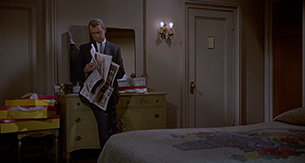 |
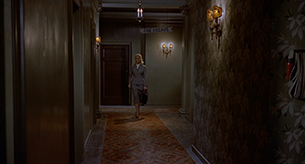 |
Judy (at the hotel): Well?
John: It should be back from your face and pinned at the neck. I told her that.
I told you that.
Judy: We tried it. It just didn't seem to suit me.
John: Please, Judy.
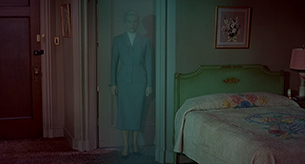 |
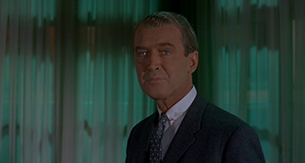 |
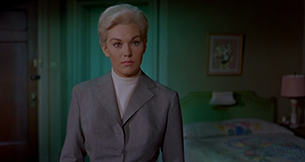 |
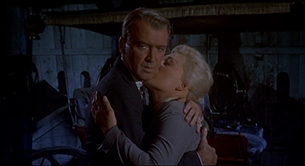 |
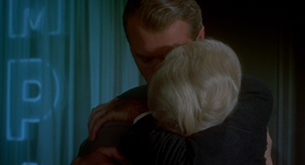 |
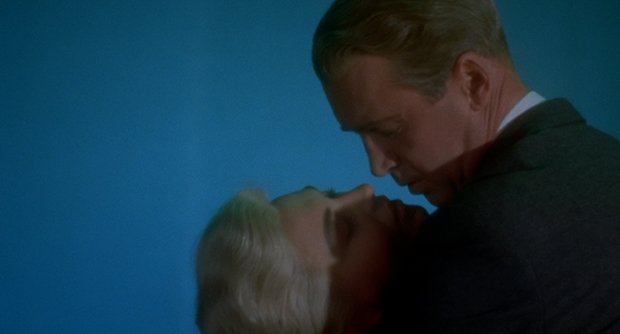 |
How famous is the scene wherein Judy emerges from the bathroom, in the ghostly green light of the neon, reformed as Madeleine. There have been touches of this green throughout the film, in nearly every scene, but especially in connection with the flower shop. Here, rather than the deep green of the great "evergreen" trees, it is the color of swamp gas that is the product of the breakdown of organic matter in swampy areas. She is a ghostly apparition that becomes concrete as she emerges from the vaporous green. They kiss and the scene revolves, John distracted even though he now has Madeleine in his arms, returned to the livery stable at San Juan Bautista where he'd encouraged Madeleine to stay in the present, with him, when she was distracted. How ancient, antique is this love of John's is sensed, Madeleine's hair glowing white against the green, his arms wrapped around her. But, ultimately, and this seems to be forgotten in the public's memory of the film, the green resolves into a beautiful deep azure blue, no neon or drapery or framed wall paintings or furnishings observed, so it may seem that they kiss against an infinite background so saturated with this blue that this is all there is.
We know from the music, the liebestod, for a moment, John has Madeleine. For a moment, Tristan has Iseult. For a moment, Judy hopes she has John.
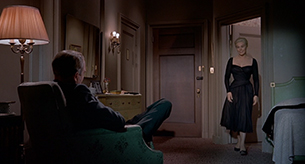 |
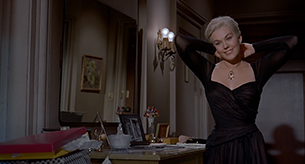 |
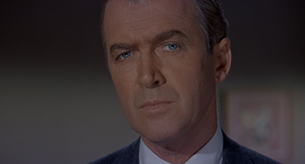 |
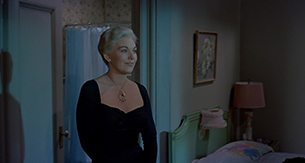 |
Have we noticed how the headboard of the bed is green? Have we noticed how when Judy emerged from the bathroom as Madeleine, the frilly lamp hooked to the headboard had disappeared and then appeared again as she stepped out of the green as a solid woman, formed out of the green vapor? Have we noticed that after the love scene, when Judy emerges from the bathroom again, a trace of the blue remains that had engulfed them?
There seem to me two ways of looking at this scene in which Judy puts on Carlotta's necklace as she prepares to go out for dinner. We are familiar with how John, having helped Judy put on Carlotta's necklace, realizes who she is, and this immediately distances him from her even as she hopes she finally has him.
But I think there is another way of looking at this scene as well. We have to wonder, for one, what broke Midge and John up? Why is John still available? When Judy steps out of the bathroom, this time in her black dress, ebullient and ready to go have a hearty steak dinner at Ernie's, though John calls her over to him, he is already distancing himself. We can feel it in Jimmy Stewart's stance, how he sits in his chair with the same sense of ease as at Midge's. Urgency is gone. His wonder and anxiety at the remoteness yet nearness of Madeleine in Judy is gone. The mystery is gone. One can feel how he has possessed his vision of Madeleine in a way as close as he knows can be accomplished, but this is a real woman, not his dream, and no matter what she will never be right. We can feel how she does not actually have him already. His desire has been both satiated and denied. She calls him "my love" and notes he doesn't respond in kind. She asks if he likes her and he says, "Uh hum", with a certain agreeable even jocular tolerance but not much more. Judy's good for a little more sex, but beyond that? John is already moving on. If Judy hadn't put on Carlotta's necklace he would have found another excuse to dump her. Carlotta's necklace seems to now appear as but an excuse for him to get rid of her, a reminder that he must do so, because she is not Madeleine, she is not Carlotta. One could question why Judy has so conveniently forgotten at this moment to keep this memento secret, when she has believed she has become Madeleine for John, when she believes she finally possesses him. One could wonder at her error, the psychology behind it, but to me the pendant seems instead a reassertion of whatever is Carlotta that she can't be physically possessed. Eurydice flees the living and John wants Eurydice.
Judy (at the hotel): Well?
John: It should be back from your face and pinned at the neck. I told her that.
I told you that.
Judy: We tried it. It just didn't seem to suit me.
John: Please, Judy.
(Later.)
Judy: Where shall we go for dinner?
John: Anywhere you like.
Judy: Ernie's?
John: You have a thing about Ernie's, don't you?
Judy: After all, it's our place. (Entering from the bathroom.)
Hello, my love. Like me?
John: Uh hum.
Judy: Is that the best you can do?
John: Come here.
Judy: No. You'll muss me.
John: Well, that's what I had in mind. Come here.
Judy: It's too late. I got my face on. I'm suddenly hungry. Would you rather go somewhere else?
John: No. Ernie's is fine.
Judy:
I'm going to have...I'm going to have one of those big, beautiful steaks.
Let me see. To start I think I'll... Help me with this, will you?
John: I have it. How do you work this thing?
Judy: Can't you see?
John: Ah. Now, there you are.
Judy: Thank you. I'm just about ready.
All I've got to do is find my lipstick. (John notices the necklace.)
Where did I put it? I had it a minute ago.
I wonder if it's here. Here it is.
There, I'm ready.
But first, muss me a little? Scottie, I do have you now, don't I?
John: How would you like to go someplace out of town for dinner? Maybe we could drive down the peninsula.
Judy: All right. If you like.
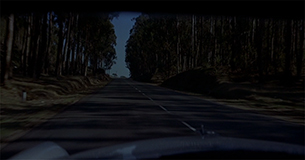 |
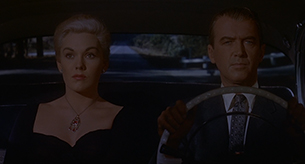 |
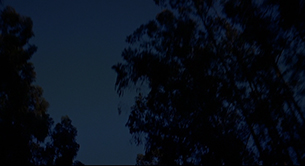 |
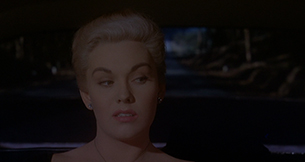 |
During the initial drive down to San Juan Bautista, Madeleine, sitting as still as a statue, had observed the road and the sky, and Hitchcock revives these memories, so that Judy is living again the first drive, and she becomes concerned. San Juan Bautista is an hour and a half away, John appears to be driving there, and she has a long time to consider the fact she believed they were on their way to dinner but are instead returning to the scene of the crime where John says he has one final thing to do in order to be free of the past.
It is John who so often has watched Madeleine in profile. Now, on the second drive down to San Juan Bautista, Judy and the camera observe John in profile.
There's nothing else to say about the film from this point until the end credits except to thrill over how brilliant Stewart and Novak are. Some of the expressions that pass over Stewart's face are truly diabolical, John enjoying a little too much dragging Judy up the stairs during his second chance, his opportunity to conquer the tower and redeem himself, which might strike one as more than a little sexual and phallic considering that he has finally, only a couple of hours ago, had sex with Judy. His resistance to even touching her before her transformation into Madeleine had to do with her not fitting his fantasy, but if we deliberate even two seconds on this then one understands he would have been unable to "perform", which the film has been hinting at from the beginning, that John's vertigo, his fear of heights, had been complicated with a profound impotence. John is now feeling a little more secure in himself again, having had sex with Judy--and we need to remember this, that the woman he is dragging up the stairs is a person with whom he's just had sex after abusively refashioning her to be a Madeleine surrogate--a person who, as far as he knew, had only reminded him of Madeleine.
John's dragging Judy up the stairs is an active sex scene following up the one only hinted at in the more metaphysical, green ghost scene at the hotel with its uniting of souls . Much has been written about Wagner's Tristan and Isolde, its liebestod (love-death) theme, and the compelling dissonance of the The Tristan Chord, the tensions created in the music that go long unresolved...and finally there's the climax, but in that climax there's a hangnail that immediately distracts from dissolution into the "other". Hitchcock gave that hotel scene to Bernard Hermann, all its sexual implications described and tied up in the musical score that soars John to the gate of blue heaven and melodramatically asserts John is satisfied to have visited the threshold. Instead, John's desire is primed and refined to kill the inferior angel that asks its pay for his satisfaction. Now that John's got some of his confidence back he's going to have it rough with Judy for how she's not the woman he wanted her to be. "I do have you now, don't I?" Judy had said. But it could never be about her possessing him, only she by him. The necklace steps in as a device that gives John a second chance at possession through rejecting and denying her. Never mind all the bonafides he has for rejecting her, which we have known about since we saw Madeleine's gray funeral suit in her closet (and not even neatly arranged on that hangar), the necklace symbolizes all the excuses that John would have been used to drop her had she not pulled the necklace out of the ether and wrapped it around her neck, the same neck he will grasp as he drags her up the stairs, the neck that Roger chokes the life out of in the book.
John doesn't love Judy. He hadn't loved Midge either.
Now it's John's turn to be ebullient, exuberant as he manhandles and punishes this woman to whom he had made love but an hour or two before. Jimmy Stewart obviously knows that in the novel Roger strangles Renee, and while Stewart's acting career won't be burdened with his character killing Judy, Hitchcock ensures John comes close to it, his hands briefly on Judy's neck so that even before I had read the novel I wondered if instead the Judy character in the book had been murdered by strangulation. Stewart and Novak briefly communicate this. But John doesn't kill her. Stewart and Novak continue on up the stairs, Novak expressing true terror--you can't even see her face much of the time they're struggling up the stairs, she resisting him, pulling down, he pulling her up, so she is buried down in his chest, in his arms, trying to resist, to keep from being dragged up any further, but you hear the very immediate fear in her voice when she replies to his questions, and then calming as she attempts to plead with John when he's sensible enough to hear, trying to make him believe that she loves him even after she's revealed what happened, that Elster broke his wife's neck. But had she really tried to stop Elster, as she says? Is that why she screamed? John demands, why did she scream. He demands again. He doesn't sound satisfied with Judy's answer. Hitchcock invites the audience to be dissatisfied with Judy's answer. And I consider that she simply screamed because she saw herself in the woman Elster threw out of the tower, the real Madeleine, and it surprised and shocked her to see her doppelganger being held dead in Elster's arms. She screamed because she saw herself. Then Elster, after throwing his wife out the window, grabbed Judy and clapped his hand over her mouth, uncertain if that shock might cause her to scream again.
Hitchcock has John repeat all his lines twice, during the ascent up the stairs, and I've wondered if this is so that he may be addressing both Judy and Madeleine. The repetition ends when they reach the top of the stairs, John having "made it". This isn't just John having beaten his vertigo, his fear of heights. John's climbed the phallic tower, and with his violence against Judy has attained a passionate satisfaction that eluded him at the hotel. Judy does not own him, he owns her, he's the one with the power. Post-coitus, he softens for a moment as he tells Judy she shouldn't have kept souvenirs of the killing, she shouldn't have been so sentimental. Post-coitus, the rage lessens as he confusedly says to Judy, "I loved you so, Madeleine". Loved, not love. Loved a fantasy conjured to attract and distract, a chimera tooled to resonate to his flaws. Judy instead thinks she hears John telling her how much he still loves her and tells him her own story of how she could have gotten away but didn't because she loved him and wanted him. She begs him to protect her. John doesn't even consider it. His response is not simply, "It's too late", but "It's too late, there's no bringing her back." He has possessed Madeleine, who was never anything but a fantasy, as much as possible.
On a practical, skill level, as Stewart drags Novak up the stairs, you get a sense of him as the actor also protecting her, and working with her to get her face up and into frame and into the light where it can be seen. The two as a team, supporting one another through this difficult scene, can be discerned if one looks for it, but isn't apparent as the way it's done can be interpreted as part of Judy and John struggling. I would love to hear Kim Novak interviewed on that scene, and how they rehearsed it, how they worked it out between themselves.
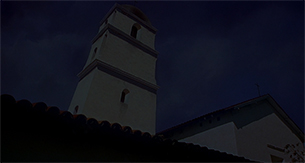 |
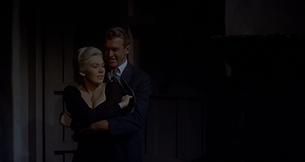 |
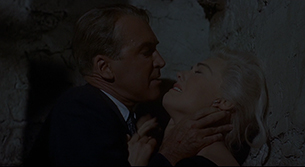 |
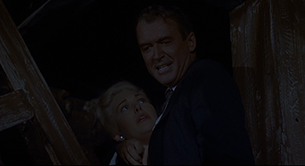 |
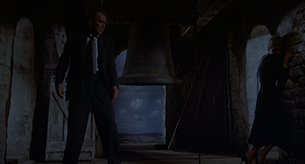 |
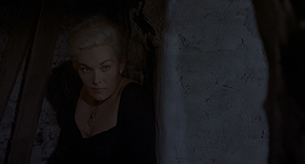 |
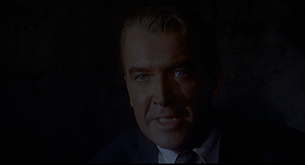 |
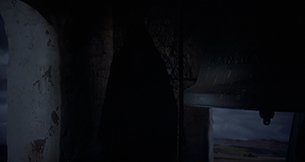 |
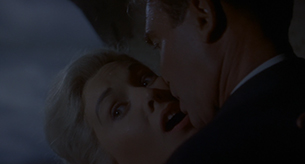 |
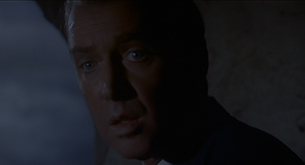 |
I suppose we could discuss for hours the meaning of the nun who appears out of the dark, whose abysmal presence startles and separates Judy from John, leading to her fall out of the window. The nun reminds of the dark of the grave. In that dark form is also Carlotta, who in the novel had wanted to be a nun, and was buried at the Mission Dolores in the film. She may seem to be Carlotta seeking justice, or even Madeleine. She reminds of Judy-as-Madeleine's gloved black hand as she points to the rings of the great tree and says that there is where she died. She also reminds of John accusing Midge of being motherly and of Midge later assuring John at the hospital that he wasn't lost, mother was there. All these things and more are rolled up in the shadow of the nun, but the most essential reference is this. Why did Judy scream upon ascending the stairs the first time? Now, she is in John's arms at the window, in the place of Madeleine being held by Elster, and what Judy now screams at is herself. She sees herself ascend the stairs just as Elster throws Madeleine out the window.
Judy has become Madeleine and fate must make her fall as Madeleine fell. The question then is how this connects with the opening crisis in the film, which was John hanging from the gutter over the abyss, the officer offering his hand to pull John up, and then plummeting off the roof over him. Midge had told him his vertigo was unlikely to change if he didn't suffer another similar shock. She'd also told a doctor that one of John's problems was that he was still in love with Madeleine. In John's nightmare, Carlotta's necklace had caught his attention, which led him to tumble into her grave, so that he fell and fell toward the through the roof on which Madeleine had landed, and continued to plummet into a blank white void, at which point he was startled awake.
In North by Northwest, which had not yet been filmed but is referenced by way of the cantilever bra, at the end Cary Grant is hanging by his fingertips onto Mount Rushmore. Eva Marie Saint is below him and has just managed to reach up and grasp his extended hand. Grant's grip is threatened by a bad guy, who happens to be likely gay and in love with James Mason, stepping on his fingers, but that situation is taken care of when the FBI shoot him and he tumbles over Grant's head off Mount Rushmore. As the scene closes, Eva's safety is not yet assured. Grant is encouraging her to reach up, to hang on, and she says she can't. The situation looks desperate, though we know there's no way possible Eva's not going to get out of this alive with Grant. Then the context changes and he pulls her up onto the top berth in their room on the train, the two supposedly married now and honeymooning. Just as we weren't shown John's rescue, we are not shown how Eva manages to hang on, we are not shown their rescue, but it has happened. The happy ending to the cliffhanger is supplied Eva and Grant, as if in part to make up for the audience having been deprived it here. But a happy ending could not be had as Judy was an accomplice to a murder and had throughout the movie conned and lied to John. More importantly, strategically, Kim Novack could not give John one last passionate kiss before she was carted off to justice and jail, because of John's abuse of Judy.
At this point, winding this all up, I keep returning to the look John gives the nun who happens upon them in the bell tower, and I think (1) doesn't it remind me of a teenager's response to an authority figure catching them in the middle of doing something they ought not to be doing--whether it's being caught in the primal act or snagging a cookie from the cookie jar--and (2) there's more instinctual fear in that shot than anywhere else with him in the film. And by instinctual, I think that's the alarm of a man whose deepest, darkest secrets have been found out. John had hidden at the inquest how involved he was with Madeleine, and rather than turn Judy over to the police he had dragged her up the tower to exact his own form of punishment and justice. Now here comes this nun who "heard voices", and what exactly what had she heard? This is the face of a man who had not expected a witness. Or maybe it is only John astonished by the arrival of fate, which he recognizes in the nun.
John is not the "everyperson" as he stands on the lip of the tower looking down at Judy's body. He had been a detective. When he'd realized who Judy was he could have very neatly had her arrested. Dragging her up the bell tower in order to exact a confession out of her was a no-no, just as he should not have taken the supposedly suicidal Madeleine to the tower with the idea he would chase away her ghosts, make her realize she'd been there before and finish her dream. Mother, in some ways, ties up a nasty loose end by startling Judy and making her a non-issue. John won't have a living non-Madeleine, sitting in jail, tugging at his ankle the rest of his life by the mere fact of her continuing existence.
These are all valid things to consider as we ponder the film's ending and where it might have gone had Mother Superior not shown up. Hitchcock and the writers considered the alternatives and ticked off how they wouldn't work.
Mother Superior had to show up but dared not ask Hitchcock, "Am I the deus ex machina?"
The ending in the movie is superior that of the book. Or perhaps the book's ending is fine for a novel but not for the movie. Roger raves for a short paragraph of monologue while choking Renee, unaware he's choking her, then is surprised to find she's dead. He screams, which catches the attention of other people at the hotel, the authorities arrive, he kisses Renee one last time and is led away. This works for Europe and France looking for what was lost in WWII, thinking they've found what they'd lost, and having what they lost tell them that what they thought they'd perceived was wrong, or the past is just plain gone forever, the horrors between now and then making it irretrievable. You can't pick up and go along as if nothing happened. I'm not sure, however, how well it works for Roger murdering Renee. In either case, the counterfeit's fate was sealed when Madeleine died. The principle difference between the film and book is Hitchcock chose to get rid of Roger being the literal hand of fate in the preordained death of Judy, instead having destiny seize her off screen and pull her into the hereafter. Which is for the better. Do we hear Judy's body thumb on the clay tiles as we heard Madeleine's thump? I don't recollect. Do you remember? I doubt it.
We now can see how manipulative and abusive John was, but I'm not sure this was as apparent in the 1950s, or if it was apparent I wonder if that's why the film wasn't that well received, because it made the public perhaps a little too uncomfortable. Still, I'm pretty sure that Hitchcock, though he makes it clear how abusive John is, didn't want the audience member going home and thinking John was an abusive man. Hitchcock allowed that the film was about necrophilia, and everyone gasps at that but I imagine Hitchcock would have said that nostalgia and sentimentality were forms of necrophilia, not only the fetishism that has John compelling Judy to take up her Madeleine costume again. Sometimes we say the past is a living thing, sometimes we say it is dead, and John's necrophiliac love for Madeleine (or Carlotta) isn't so shocking if all that is past is dead and an inhabitant of the shadows that Orpheus plumbs in his attempt to bring Eurydice back into the light. No one is shocked when Cocteau's Orpheus loves Death and Death loves him. Indeed, the love between Death and Orpheus feels far more vivid and real than Orpheus' love for Eurydice in life, as if the Apollonian sunlight makes that love too buoyant and lacking in depth. Only Heurtebise appreciates Eurydice in life, the drama of her ephemerality, he doesn't crave to possess her. Madeleine was never a real person to John as she didn't exist. Neither is Judy ever a real person to John, and whenever she does threaten to become real he rebukes her. She was only a medium.
Judy: We're going awfully far.
John: I just feel like driving. Are you terribly hungry?
Judy: No, it's all right. Where are you going?
John: One final thing I have to do and then I'll be free of the past.
Judy: Scottie, why are we here?
John: I told you. I have to go back into the past once more, just once more, for the last time.
Judy: Why? Why here?
John: Madeleine died here, Judy.
Judy: I don't want to go. I'd rather wait.
John: No, I need you.
Judy: Why?
John: I need you to be Madeleine for a while, and when it's done, we'll both be free.
Judy: I'm scared.
John: No, I have to tell you about Madeleine now.
Right there. We stood there, and I kissed her for the last time.
And she said, "If you lose me, you'll know that I love you and wanted to keep loving you." And I said, "I won't lose you." But I did. And then she turned and ran into the church. When I followed her, it was too late.
Judy: I don't want to go in there!
John: It was too late. I couldn't find her, and then I heard footsteps on the stairs.
She was running up the tower. Right here. See? She was running up the stairs and through the trap door at the top of the tower. I tried to follow her, but I couldn't get to the top. I tried, but I couldn't get to the top. One doesn't often get a second chance.
I want to stop being haunted. You're my second chance, Judy. You're my second chance.
Judy: Take me away!
John: You look like Madeleine now. Go up the stairs.
Judy: No!
John: Go up the stairs. You go up the stairs, Judy and I'll follow.
This was as far as I could get, but you went on. Remember?
The necklace, Madeleine. That was the slip.
I remembered the necklace.
Judy: Let me go!
John: No. We're going up the tower, Madeleine.
Judy: You can't! You're afraid!
John: We'll see. We'll see. This is my second chance.
Judy: Please!
John: But you knew that day that I wouldn't be able to follow you, didn't you. Who was up there when you got up there? Elster and his wife?
Judy: Yes.
John: And she was the one who died. The real wife, not you. You were the counterfeit, you were the counterfeit weren't you? Was she dead or alive?
Judy: Dead! He'd broken her neck.
John: He'd broken her neck. Wasn't taking any chances, was he?
So, when you got up there, he pushed her off the tower, but it was you who screamed. Why did you scream?
Judy: I wanted to stop it, Scottie. I ran up to stop it.
John: You wanted to stop it? Why did you scream, since you tricked me so well up to then?
You played the wife very well, Judy. He made you over, didn't he?
He made you over just like I made you over, only better.
Not only the clothes and the hair, but the looks, and the manner, and the words, and those beautiful phony trances.
And you jumped into the Bay, didn't you?
I'll bet you're a wonderful swimmer, aren't you?
Aren't you?
Judy: Yes!
John: Aren't you! And then what did he do? Did he train you? Did he rehearse you?
Did he tell you exactly what to do, what to say?
You were a very apt pupil, too, weren't you? You were a very apt pupil.
Why did you pick on me? Why me? Why me?
Judy: Your accident!
John: The accident! I was the setup, wasn't I?
I was the setup. I was the made-to-order witness. (At height of stairs.)
I...I made it.
I made it.
Judy: What are you going to do?
John: We're going up and look at the scene of the crime. Come on, Judy. This is where it happened. The two of you hid back there and waited for it to clear then you sneaked down and drove into town, is that it?
And then? You were his girl, huh? Well, what happened to you?
What happened to you? Did he ditch you?
Oh, Judy, with all of his wife's money and all that freedom and that power, and he ditched you. What a shame. He knew he was safe. He knew you couldn't talk.
Did he give you anything?
Judy: Some money.
John: And the necklace, Carlotta's necklace. There was where you made your mistake, Judy. You shouldn't keep souvenirs of a killing.
You shouldn't have been...you shouldn't have been that sentimental.
I loved you so, Madeleine.
Judy: Scottie, I was safe when you found me.
There was nothing that you could prove.
But when I saw you again, I couldn't run away. I loved you so.
I walked into danger and let you change me because I loved you and I wanted you.
Scottie, please. You loved me. Keep me safe. Please!
John: It's too late. It's too late. There's no bringing her back.
Judy: Please. (They kiss.) No! No!
Nun: I heard voices.
(Judy screams, falling.)
Nun: God have mercy. (Rings the bell.)
January 2021. Approx 22,120 words or 44 single-spaced pages. A 170 minute read at 130 wpm.
Return to the top of the page.